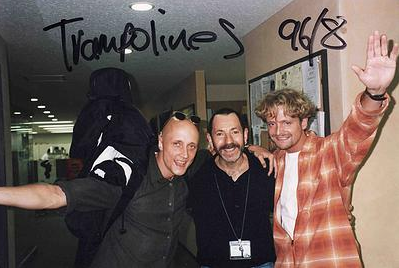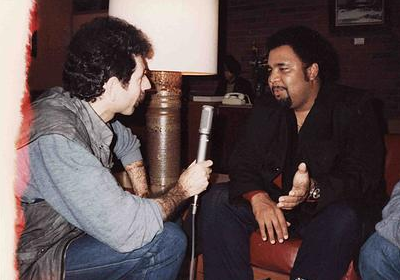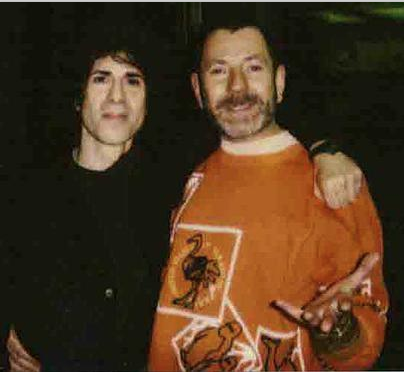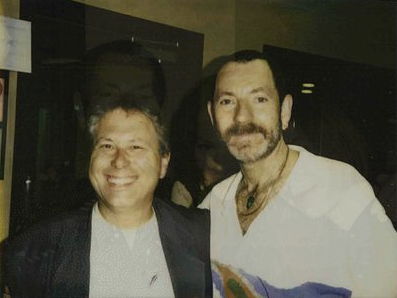Brian Richy is a prolific voice artist from Canada. He started his career in Toronto and soon moved to Japan, following a rock band from that country. He worked as a guitar player, music writer and announcer of commercials in English. Back in Toronto, Canada, Brian set up his own home studio and became an independent talent performing all kind of voice-overs, impersonating characters and giving truth and authenticity to everything he reads. An interview by Constantino de Miguel for DirectVoices.
Podcast: Play in new window | Download
Constantino de Miguel: We know you as a voice talent but you have been doing many many different things. You have an impressive background as a song writer, music creator. Also, as a writer of films and animations, right? Let us know more about your prolific career, Brian.
Brian Richy: Yes, it was quite a crazy career. To go back, my big dream was originally to be a radio DJ. That was my big thing. I used to send out cassettes all over Canada with copies of my announcing and everybody used to write back and tell me the same thing. And that was, “You sound too much like a girl!”
CdM: Oh, really? Well, at that age, of course, your voice probably was in the process of changing, I guess.
BR: And, it took a long time because I think that was, I think I was 18, 17-18. They said, “Your voice is still quite high. You don’t even sound like a DJ. You sound more like a girl.” It was so depressing! I thought, “Oh my God!” My voice didn’t change until my late twenties. Can you believe that?
CdM: Well, you know. Hormones and genetics, you cannot predict them. Also, I was worried myself that, yeah. That changes, that the excitement of the mic, and being a radio ham at Clandestine Radio amateur (?). Well, that’s a passion that– The voice, how it sounds maybe it’s the detail, you know. That’s not what matters most. Maybe, relations to girls or to, you know, probably. That was an issue at the time, I guess.
BR: You know, the girls liked it because they thought I sounded nice and soft and not too threatening. I didn’t have a deep voice. It was kind of a problem but I eventually got over it. So, the prolific career, yeah.
CdM: Song writer, music creator. Well, that’s a lot! And then, well, I read about your biography that you jumped all the way to Japan, and all that.
BR: Yeah. I mean I could write a book. I think probably one of the biggest things I was involved in creating Toronto’s first community access TV station which is called City Television. I was able to be a part of the building team and then I was subsequently hired as head of the production. So basically, I looked after all the recordings and setting up microphones. That was one of the first times that I actually started doing the occasional off-camera voice work like Station ID’s, Guest Introductions & some Commercials. As a side business I was doing freelance music work. You know, writing songs for local documentary companies and things like that. I did a few CBC radio shows. And then, one day, I met these Japanese musicians and they asked me if I wanted to join their band because they wanted to do some songs in English. So basically, they put me in the band as a back-up guitarist and vocal. So, I went back to Northern Japan with them. Their record deal fell through and they quit the Music Business altogether!
CdM: What decade are we talking about?
BR: Oh, in the 80s.
CdM: So, that happened in the 80s. Everything started to change; I guess, well, for you and for, I mean, your career all of a sudden in Japan. So–
BR: Yeah. Because I was stranded!
CdM: You didn’t come back to Canada then. You stayed there for a while?
BR: I was there for 21 years!
CdM: Alright. So, you learned Japanese?
BR: Yes. Because I was stranded, I didn’t know what to do. Through some music friends told me there was a new FM station opening up. They said that, “You should approach them.” And I did, I found out who the director was and I ended up landing a weekly radio show. And then, I started writing music again and doing commercials and then I ended up in Tokyo because they said, “You have to move to Tokyo if you want to do the music and broadcasting big time.” I was only in northern Japan for a couple of years and then moved down to Tokyo. And then I started getting into doing major commercials, major radio station work and voice work. It just took off BOOM!
CdM: Like (Japanese term)? The Japanese radio, right?
BR: Yes. The ones I was involved with were quite new. There was Inter FM, and the other one was J-Wave, which was also a new station basically that opened up in the 80s. That was kind of branded as the new upscale radio which had a much more broader sophistication of music compared to the typical J-Pop. So, the music scene was changing quite rapidly. For example, European music, world music was really starting to take off. Music from the Middle East, India, Russia, Bangla. They were all just taking off like crazy. Basically, I was involved in the business at its growth and the peak because it all basically imploded in the middle 90s.
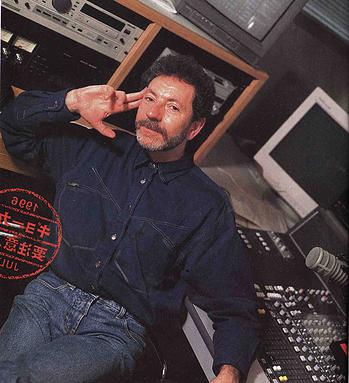
CdM: And, I guess, as a matter of course, broadcasting in English to Japanese or international audience in Japan and overseas, I guess?
BR: Yes. It was the big thing. English was BOSS. But, not anymore. Those days are over. If you go to the websites of all those radio stations that I worked for, I’d say probably 99% of the programming now is in Japanese.
CdM: Yes, it was (inaudible) not just in Japan. In many countries where they used to have a foreign language services. Suddenly, in national radio, they have a broadcasting for overseas in different languages but also for, suddenly English. In that case, I guess, Japanese wanted to learn English or you had also in Europe and many countries. All these stations, they have either closed down or no more activity in foreign languages.
BR: I don’t know what happened. What happened to that internationalism?
CdM: The internet came and covered that glorious past of foreign radio, I guess.
BR: That’s true, Constantino. The internet, you know, it’s like video killed the radio star and it’s like the internet is basically killing everything else. But, you know, I can understand why because I think the internet video streaming will eventually take over from regular commercial radio and TV stations because it’s cheaper. They don’t have to spend hundreds of thousands of dollars on expensive antenna and transmission systems and transmitters and expensive studios. I mean, all you need is not a huge room and you can do a video streaming.
CdM: But, what hasn’t changed a toll is of course, the talent, the soul of the artist, the ability to create and interpret music or sounds in talking about the voice, voiceovers. I wonder, among all these creative areas, music, also animations, films, why did you choose to remain a voiceover artist?
BR: Well after deciding to move back to Toronto Canada instead of London UK, I realized there was no way I could start over from scratch to be a working musician and or local Voice Over Talent having no local roots or connections. So I decided to take the chance on empowering the Internet to become an International Voice Actor. After going through all my working experiences I think I have finally found my niche….a Character Voice Actor and I just love it!!
CdM: Oh, okay. And actually this coincides with the fact that the internet opens up many possibilities to be able work with foreign clients.
CdM: Just from the comfort of your home studio which is I think is a bonus. I mean that you are free to plan your time, etcetera, etcetera. So I’m wondering is it hard to remain in the business when you are no longer like visiting clients locally in Toronto? The market all of a sudden has expanded probably not of course in Canada first of all, but then the rest of the world. Is the advantages more than the disadvantages? How do you see the opportunities for a voice talent now a days?
BR: I think it’s great. I can say God bless the internet, God bless technology and yeah I don’t, I don’t have to worry about what’s going on locally. I’m discovering that more and more companies are starting to move away from union work and are moving slowly towards non-union talent. And the reason that is, it seems there’s a lot of bureaucracy involved that turns people off.
CdM: Yes. What’s really innate for the actors to be on a union because this is something people ask us. Is it worth it to pay the fee or to become a member of a union? Do we get something in return. Like I mean value jobs or is yes, red tape and no real service when you can actually build up a career on your own just by e-marketing and being yourself known all over the place. What is your view. What are your views about this?
BR: Well I’ve heard that out of all the hundreds of thousands of artists that are in the union across Canada, only maybe 5% actually can make a full time living within the union. As far as I’m concerned having a home studio and able to market and connect yourself with people all over the world, I think it’s a much, much better deal. The reason is because you are in control and you don’t have to rely on waiting for an agent to call you. You don’t have to worry about the union and fees and things like that. You don’t have to worry about cattle calls. But nowadays, because of technology you have a choice. For example, our relationship is a perfect example. I mean, you know if I hadn’t been aggressively marketing I would never, ever have got to know you Constantino. So you know, that’s the fact that we’re talking now and I’m having the pleasure of being interviewed by you. This is the perfect example of marketing and the relationships that can take place.
CdM: As you know, this broadcast is part of blog called Voice Over Plus which is part of Direct Voices. It’s paid to play websites devoted to voice over talents. There are very many out there, this paid-to-play site actually has an objective to cut off intermediaries so you can have your profile online and you can just contact or get contacted by a potential client directly so you, I mean, you can pay your fee to have a better profile but you don’t need to pay a fee if you don’t want to. You can have a basic profile and the client will just contact you directly. We have noticed that the client sometimes they don’t use the local form, they just go in the site and then get the contact information from the voice talent and they ring the voice talent directly. That, that’s the way, it’s like uber for for taxis or Air B and B or these new economy thing that you know, you get the contact directly with the client. That’s the, the philosophy behind it. Of course it’s not a miracle you are also in competition with many, many people and there are also casting calls and auditions but auditions that are limited to a maximum of ten talents each time.
CdM: Because to avoid these cattle call thing. So that’s probably a formula that of course will evolve, will improve but will certainly condemn maybe some unions to history because this part of the world in Europe the, in France I can tell you the unions are not so operational anymore.
CdM: So also, a French voice talent they are just on their own. They have of course a specific regime to, for payments and all that because you know there are many taxes and social security thing but there’s some regulations to respect but then you are completely on your own and independent. There are good thing and bad things, you are on your own so you have to be more proactive in marketing yourself, that’s the only thing. Okay so. Now, let’s get more like artistic about you know with voicing, the, the, your talents. Because you and your website you mentioned your voice could be mature, warm, smooth, natural, conversational, really rough, emotive, and many, many different tones.
CdM: How can you offer this diversity of tones Brian?
BR: Well, to be perfectly honest it’s kind of a trade off. Because the business as you said is very competitive and there are so many voice talents out there that basically do everything. They do technical narrations and they do medical narrations and they do IVRs, they do corporate stuff, they do books, they do e-learning, they do this, they do that, they do everything. I do lots of auditions and I’ve discovered basically through the many auditions that I do, what I feel confident about and what I don’t wanna touch. I do not touch technical narrations, I do not touch medical. Half of those words I can’t even pronounce. So basically I am a voice actor you know. I’m in the zone when I am performing. I mean Even if I’m doing a corporate video voice, I like to do some sort of personification of a character who’s doing the corporate narration you know. Oh we’re looking for this type of a person, this type of a voice. Okay great. You know, we’re looking for something like a Walter Cronkite type of thing or we’re doing for something like a 1950’s style voice guy. Oh okay great, great. These things I love for example one particular website that I belong to, I’d say that every job that I got through these people has always been for a character voice and or accent.
BR: I did a character voice for Norweigian, for a Schlumberger corporate video. They were looking for a Norwegian voice. I did voices for some online gaming, video games and animation voices and things like that. I voiced like ten characters for one particular job. This is what I love to do. I can be smooth, I can be sexy, I can be rough. you know. I won’t say that I’m a schizophrenic or anything like that but I like doing multiple personality and character voices, I just love it. Probably because I’m a frustrated actor. I’ve always wanted to be an actor but put me in front of a camera and I am hopeless. But behind a microphone, I can do anything. I love the challenge and I will go beyond the call of duty to try to get that voice out or create a voice. So this is what I’m discovering about myself. The older I get the more I discover what I enjoy doing, what I like to do and what I want to focus on.
CdM: And considering your career, your experience, international and also so broad in so many talents as a voice over artist and also you’ve been in different areas in music, films, what would be the main piece of advice you would give to aspiring voice talents today?
BR: I think discover who you are. That’s the most important thing because every agent that I’ve ever spoken to, they always say “Who are you?”, “What’s your brand?”, “What’s your style?”. “People always have to put you in a box, you know. I spent hours listening to all different types of voice talents from all over the world. And After a while everybody started sounding the same and I don’t want to sound like everybody else. I wanna be me. It may take me longer to reach that plateau of what I want, but I want to be me and I want to do what I enjoy doing and I’m not interested in competing with what everybody else is doing. And I think that’s probably an aspiring voice talent has to discover. Just the same as if they wanna be a regular actor in movies. You have to basically discover what’s inside you, what you wanna get out, what kind of aspiration you have as an actor. I wanna be an action dude or I wanna be this, I wanna be that. There’s always something inside you that if you connect with it can probably help you and put you on the road rather than just throwing yourself out there and oh yeah I’m gonna do this, I’m gonna do that, I’m gonna do it all. Maybe you can start off doing it all, but I think eventually you have to kind of streamline yourself and put yourself on some sort of a track which sets you apart from the masses.
CdM: So, as the great philosopher Socrates said “Know thy self.” So this is also valid for voice talents.
BR: Oh yes!
CdM: Thousand years later, it’s still valid for this industry “know thy self” because the voice is unique. Nobody else would have your voice so don’t imitate or try to be somebody else.
CdM: We appreciate this very useful, this golden advice, piece of advice. Brian thank you for this, for your time, for this interesting interview and we wish you a lot of success in your career.

